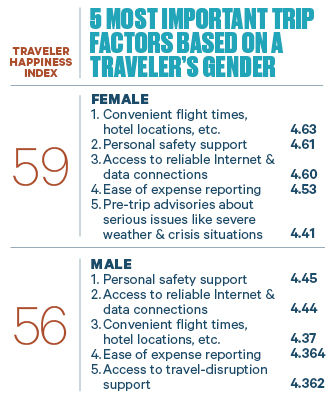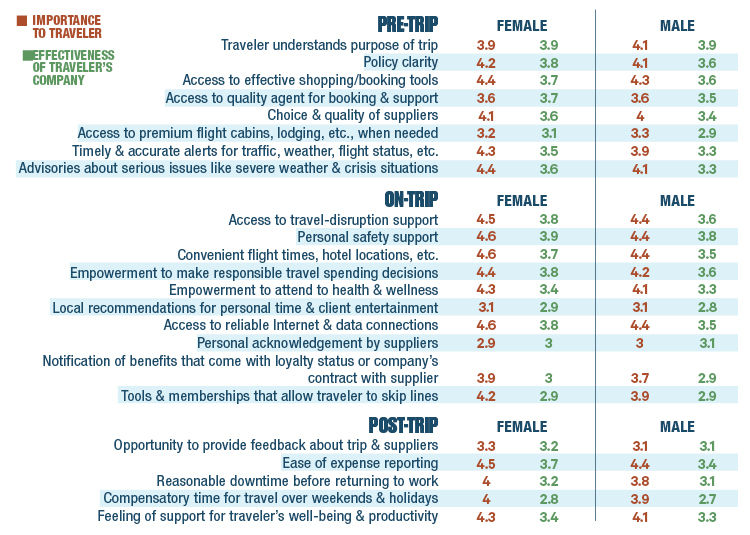
Men may be from Mars
and women from Venus, but the sexes are not so different when it comes to what
they value in business travel.
According to BTN's
research, female travelers are the more content of the two; the segment scored
59 on a 100-point scale for overall happiness, three points higher than men.
But on certain factors, the distance between the scores narrows.
Both male and female
travelers placed a premium on personal safety support; convenient flight times,
hotel locations and the like; ease of expense reporting; and access to reliable
Internet and data connections. Other factors, such as empowerment to attend to
health and wellness, may not be among the top five concerns of either segment,
but the gap between how important each is and how effectively the company is
delivering represents a significant opportunity for travel managers to improve
traveler happiness overall (see the
Traveler Perceptions table at bottom).
Highest-Impact Opportunities
The travel experience is framed not just by the trip factors
any given traveler finds important but also by how well his or her company
delivers on that priority. Above, BTN lists the trip factors women deem most
important and those that matter most to men. Scroll to the Traveler Perception
table at bottom, though, to dig deeper. Men rated five trip factors as 4.4 on a
five-point importance scale. When they rated how effective their companies were
in each of those areas, ease of expense reporting came in the lowest, at 3.4.
That full one-point gap is the biggest opportunity to improve their travel
experience.
The most important factors with the biggest gaps
between importance and delivery are your biggest opportunities. Dig around in
the Traveler Perceptions table at the end of each Travel
Program Opportunities story for more.
The Safety & Security Myth
There's a myth that
women are much more concerned about personal safety when traveling on business.
In BTN's research, the male traveling population actually ranked personal
safety support as its No. 1 concern. For women, it ranked No. 2. However, on a
five-point-scale for importance, women ranked it higher than men did.
Digging in further,
women said companies were more effective at supporting personal safety, rating
it 3.85 out of 5, while men rated their companies' effectiveness slightly
lower, at 3.8. "We get lots of training before we go into a dangerous
environment," said one female traveler who works as a media producer and
travels 10 times a year in the U.S., Canada and Europe. "There are safety
protocols and things [my company does] to mitigate dangerous situations. I feel
like they have a lot of safety checks in place and they try to keep that top of
mind."
An added layer to
the security piece of the travel puzzle is communication. Female travelers
placed a premium on receiving pre-trip travel advisories about serious
incidents, ranking it No. 5 in importance. For women, there's a significant gap
between how important this factor is and how effectively companies are meeting
expectations.
One female traveler
who worked for a pharmaceutical company told BTN about a trip to Mexico City
she felt was ill advised. "I don't feel like they really prepared those of
us going on that trip for what the atmosphere there would be like," she
said. "We did actually have somebody meet us when we got off the plane to
get us through customs, but then, on the way back, we were kind of just dropped
off at the airport. It was kind of hit or miss. It was just like, 'Here, go to
Mexico City!'"
Though men ranked
pre-trip travel advisories about serious incidents lower in importance, a
similar importance-effectiveness gap still exists, which means this still could
be a worthwhile area for travel managers to explore to boost happiness for both
segments.
Time & Convenience Rule
Both men and women
want travel to be more convenient, but they prioritize it differently. Female
travelers ranked convenient flight times, hotel locations and the like as the
most important factor for traveler happiness, at 4.6, while male travelers
ranked it third, at 4.4. Similarly, women considered tools and memberships that
would allow them to skip lines or bypass typical travel processes important,
scoring it 4.2, while men scored it 3.9. Women also scored ease of expense
reporting slightly higher in terms of importance, 4.5, than men did, 4.4.
Why do women place a
premium on convenience and time-saving measures? The answer likely points to
childcare, which, despite recent progress, still falls largely on mothers. In a
2013 study called Work Life Balance Up in the Air: Does Gender Make a
difference Between Female and Male International Business Travelers?, which was
published in the German Journal of Human Resource Management, Iris
Kollinger-Santer and Iris Fischlmayr found that gender plays no role in
work-life balance, unless of course those travelers have children.
"I used to be a
lead program manager. … That took me to Cairo, when I missed my son's first day
of kindergarten," said one woman who works in government and travels 10
times a year. "I was on travel for almost two weeks when my daughter was
four months old. This was 16 years ago, before the advent of the smartphone,
and I left that job because I did not want to be away from my baby."
Having children
places "additional burden on female travelers and does not allow any, or
at least not enough, time to deal with stress," Kollinger-Santer and
Fischlmayr wrote. "Apart from the high stress levels due to organizing
family life, childcare and household, women are confronted with a lack of
understanding from the society which might even end up in accusations."
All that is to say
that female travelers with children often deal with an added level of stress
for the reasons Kollinger-Santer and Fischlmayr mention. So when women have to
travel, they want to know they're going to be able to catch a flight at a
reasonable time and won't have to wait in long lines at each stage of the
journey. Women, too, ranked reasonable downtime before returning to the office
as more important than men did. The gap between importance and effectiveness
was almost a full point, at 0.9. For men it was 0.7.
It's worth noting,
however, that in qualitative interviews with travelers, both men and women
found it more difficult to travel after they had children. "Sunday nights
are harder with [my oldest son] because as he gets older, he's more aware that
it's Sunday night, Daddy's going away and not back until Thursday," said
one man who works in finance and travels more than 25 times per year. "He
knows how far away Thursday is now, and so the older [my children] get, the
more conscious of the absence they are and it's harder. … They're getting into
more things that I want to be a part of."
But even travelers
without children said the hassle of things like booking through a corporate
tool, going through airport security, waiting in a rental car line or at a
hotel check-in desk and filing an expense report make travel feel like a
necessary evil. "Seventy-five percent of the time, I like [traveling],"
said one woman who flies domestically 20 times or more a year. "The 25
percent [I don't like], it's not even because of my work. It's just bad timing
that makes me stress."
In terms of
convenient flight times and hotel locations, the gap between importance and
effectiveness was almost a full point for both the female and male segments.
For tools and memberships that allow travelers to bypass lines, the gap was one
point for men and 1.3 points for women. For ease of expense reporting, the gap
was nearly a full point for both.
Shrinking the Wellness Gap
Even factors that
ranked middle of the road for both women and men can play an important part in
traveler happiness. Under this umbrella are empowerment to attend to health and
wellness and a feeling that the company supports the traveler's well-being and
productivity.
One woman from
Phoenix who works as a court librarian described the exhaustion she felt from a
recent spate of travel. "We were just in Salt Lake last week. I have a
mini-conference in Scottsdale, which is close, but I have to go to that next
weekend. In two weeks, I'm going up to Flagstaff, which again is in-state, but
still it's far. It's been a mess trying to do it," she said. "My
voice is about three times deeper than normal because I got super sick. I
usually don't do very badly on airplanes, but I've been traveling so much this
year on the airplanes, being at the conference, being on the airplane again, I
got the worst cold. You've got to go into work. I've basically been going to work
and then coming home and laying on the bed."
Female travelers
ranked the traveler's ability to attend to their health and the company's
support for the traveler's well-being as more important than male travelers
did. Yet both found their companies lacking in effectiveness in this area. That
suggests this is an area where travel managers could work with HR to improve
travelers' happiness.
When it comes to
differences between male and female business travelers, however, it should be
noted exactly what is being studied: the people who continue to travel on
business. What about those who dropped out of the game? Only one-third of
travelers who participated in the survey were women. What talent and what
business is lost to lack of travel support on the road?
Traveler Perceptions on a Scale of 1 (bad) to 5
(good)
